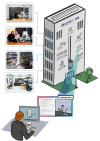Differences
This shows you the differences between two versions of the page.
| Both sides previous revisionPrevious revisionNext revision | Previous revisionNext revisionBoth sides next revision | ||
| team:daniel_nyga [2013/06/25 13:16] – [Supervised Theses] nyga | team:daniel_nyga [2016/11/19 12:48] – [About] nyga | ||
|---|---|---|---|
| Line 1: | Line 1: | ||
| ~~NOTOC~~ | ~~NOTOC~~ | ||
| - | =====Daniel Nyga====== | + | =====Daniel Nyga, M.Sc. (TUM)====== |
| - | ^ {{: | + | | {{: |
| |::: ||Research Staff\\ \\ || | |::: ||Research Staff\\ \\ || | ||
| |:::|Room: |1.77| | |:::|Room: |1.77| | ||
| - | |:::|Tel: |--49 -421 218 64039| | + | |:::|Tel: |--49 -421 218 64008| |
| |:::|Fax: |--49 -421 218 64047| | |:::|Fax: |--49 -421 218 64047| | ||
| |:::|Mail: |< | |:::|Mail: |< | ||
| |:::| || | |:::| || | ||
| + | |||
| ====About==== | ====About==== | ||
| - | Before I joined the Intelligent Autonomous Systems Group I studied Computer Science at TUM. I'm currently working on the import of knowledge from the world wide web into the knowledge base of our mobile robots. In particular, | + | Before I joined the Institute for Artificial Intelligence, |
| - | My work aims at building up action-specific knowledge | + | I'm working on the import of action-specific knowledge from the World Wide Web into the knowledge |
| - | data of a robot: | + | |
| - | {{people:nyga: | + | My work aims at building up action-specific knowledge bases from various knowledge sources, such as natural language, interactive computer games, observations of humans performing everyday activity or experience data of a robot. |
| + | |||
| + | {{research: | ||
| Knowledge about actions and objects is represented as // | Knowledge about actions and objects is represented as // | ||
| + | |||
| + | I am involved in the European research projects [[http:// | ||
| + | |||
| + | I am also the lead developer in the projects [[http:// | ||
| If you are interested in a student project in any of the above topics, please contact me via E-Mail or just drop into my office. | If you are interested in a student project in any of the above topics, please contact me via E-Mail or just drop into my office. | ||
| + | |||
| + | |||
| ====Fields of Interest==== | ====Fields of Interest==== | ||
| - | * Artificial Intelligence/Knowledge Processing | + | * Artificial Intelligence |
| + | * Probability Theory | ||
| + | * Probabilistic | ||
| * Machine Learning | * Machine Learning | ||
| * Statistical Relational Learning | * Statistical Relational Learning | ||
| Line 30: | Line 39: | ||
| ====Teaching==== | ====Teaching==== | ||
| + | * AI: Knowledge Acquisition and Representation ([[https:// | ||
| + | * Foundations of Artificial Intelligence ([[https:// | ||
| + | * AI: Knowledge Acquisition and Representation ([[https:// | ||
| + | * Foundations of Artificial Intelligence ([[https:// | ||
| + | * AI: Knowledge Acquisition and Representation ([[https:// | ||
| * Foundations of Artificial Intelligence ([[https:// | * Foundations of Artificial Intelligence ([[https:// | ||
| - | * Technical Cognitive Systems (Lecture & Tutorial, | + | * Technical Cognitive Systems (Lecture & Tutorial, |
| - | * Techniques in Artificial Intelligence (Tutorial, | + | * Techniques in Artificial Intelligence (Tutorial, |
| - | * Discrete Probability Theory (Tutorial, | + | * Discrete Probability Theory (Tutorial, |
| + | |||
| ====Supervised Theses==== | ====Supervised Theses==== | ||
| + | * Lifelong Learning of First-order Probabilistic Models for Everyday Robot Manipulation (Master' | ||
| + | * Scaling Probabilistic Completion of Robot Instructions through Semantic Information Retrieval (Master' | ||
| + | * To see what no robot has seen before - Recognizing objects based on natural-language descriptions (Master' | ||
| * Web-enabled Learning of Models for Word Sense Disambiguation (Bachelor Thesis, Stephan Epping) | * Web-enabled Learning of Models for Word Sense Disambiguation (Bachelor Thesis, Stephan Epping) | ||
| - | * Grounding Words to Objects: A Joint Model for Co-reference and Entity Resolution Using Markov Logic Networks for Robot Instruction Processing (Diploma Thesis, Florian Meyer) | + | * Grounding Words to Objects: A Joint Model for Co-reference and Entity Resolution Using Markov Logic Networks for Robot Instruction Processing (Diploma Thesis, Florian Meyer) |
| + | | ||
| ====== Publications ====== | ====== Publications ====== | ||
Prof. Dr. hc. Michael Beetz PhD
Head of Institute
Contact via
Andrea Cowley
assistant to Prof. Beetz
ai-office@cs.uni-bremen.de
Discover our VRB for innovative and interactive research

Memberships and associations:











